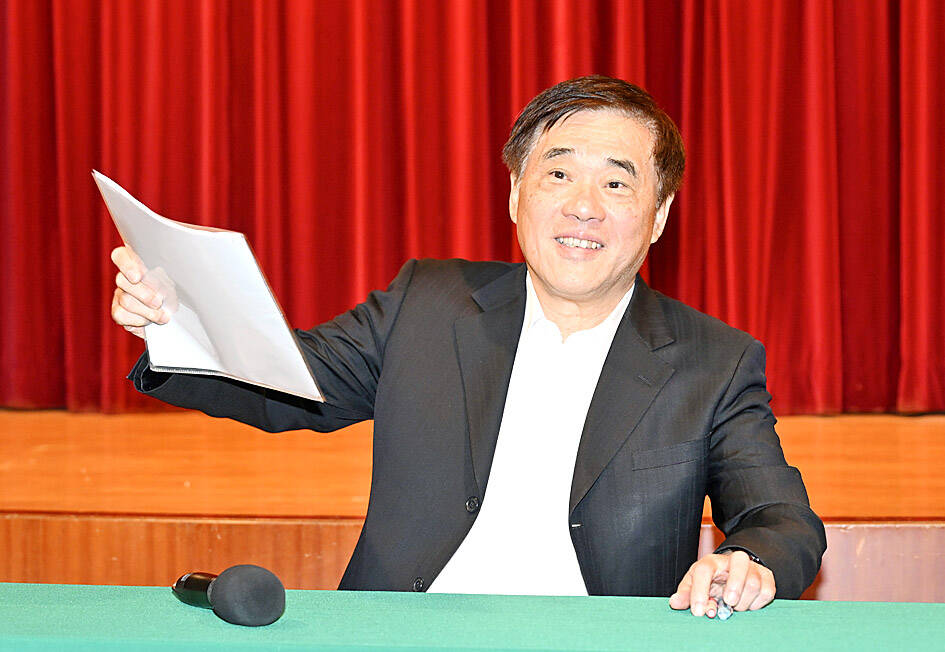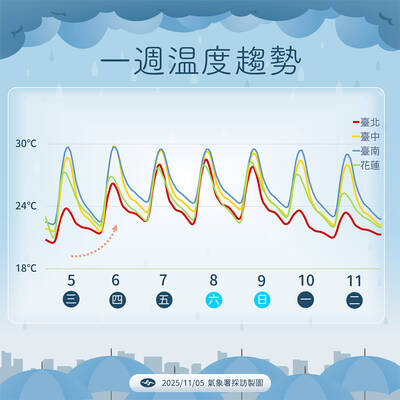Former Taipei mayor Hau Lung-bin (郝龍斌), a Chinese Nationalist Party (KMT) chair candidate, yesterday said he would call on Beijing to acknowledge the existence of the Republic of China (ROC) and pledge not to use force against Taiwan so long as it does not declare independence.
At a news conference outlining his proposed cross-strait policy, Hau detailed how he would guide the KMT’s approach to China if elected chairman.
Hau called for an internal party debate on cross-strait policy, the establishment of KMT liaison offices in Beijing and Shanghai, the expansion of the Taipei-Shanghai Twin City Forum into a broader cross-strait platform and ensuring that the party’s policy adheres to the Constitution.

Photo: Lo Pei-de, Taipei Times
Good cross-strait relations require effort from both sides, Hau said.
The biggest obstacle to peace and stability in the Taiwan Strait is China’s repeated military drills and continuous air and naval incursions near Taiwan, Hau said, adding that if elected, he would call on Beijing to commit to a “no independence, no force” framework — refraining from military action as long as Taiwan does not seek formal independence.
Although Hau did not specify how such a commitment could be secured, he emphasized that his conversations with Chinese officials have always been sincere efforts to promote exchanges and peace, rather than simply flattering them.
The KMT’s cross-strait policy should return to the framework of the ROC Constitution, Hau said, describing it as Taiwan’s best safeguard and the strongest legal link between the two sides.
He said that President William Lai (賴清德) was “hollowing out” the ROC and deliberately distorting the Constitution.
Beijing must acknowledge the reality of the ROC’s existence, he said, adding that if it does not, the legal and historical connection between the two sides would continue to wither.
“The two sides are not in a state-to-state relationship,” Hau said. “For me, cross-strait relations are relations between the Taiwan area and the Mainland area; and China is the Republic of China.”
The people of Taiwan can only feel protected if the ROC is acknowledged and respected, and only then can they rationally work toward goals beneficial to people on both sides of the Strait, while continuing to preserve their democratic way of life, he said.
Hau said that the “one China” mentioned in the so-called “1992 consensus” refers to the ROC.
The “1992 consensus” refers to a tacit understanding between the KMT and the Chinese Communist Party that both sides of the Taiwan Strait acknowledge that there is “one China,” with each side having its own interpretation of what “China” means.
If China wishes for dialogue and exchanges to proceed on that basis, it must first respect the ROC’s existence, Hau said.

Three Taiwanese airlines have prohibited passengers from packing Bluetooth earbuds and their charger cases in checked luggage. EVA Air and Uni Air said that Bluetooth earbuds and charger cases are categorized as portable electronic devices, which should be switched off if they are placed in checked luggage based on international aviation safety regulations. They must not be in standby or sleep mode. However, as charging would continue when earbuds are placed in the charger cases, which would contravene international aviation regulations, their cases must be carried as hand luggage, they said. Tigerair Taiwan said that earbud charger cases are equipped

Foreign travelers entering Taiwan on a short layover via Taiwan Taoyuan International Airport are receiving NT$600 gift vouchers from yesterday, the Tourism Administration said, adding that it hopes the incentive would boost tourism consumption at the airport. The program, which allows travelers holding non-Taiwan passports who enter the country during a layover of up to 24 hours to claim a voucher, aims to promote attractions at the airport, the agency said in a statement on Friday. To participate, travelers must sign up on the campaign Web site, the agency said. They can then present their passport and boarding pass for their connecting international

UNILATERAL MOVES: Officials have raised concerns that Beijing could try to exert economic control over Kinmen in a key development plan next year The Civil Aviation Administration (CAA) yesterday said that China has so far failed to provide any information about a new airport expected to open next year that is less than 10km from a Taiwanese airport, raising flight safety concerns. Xiamen Xiangan International Airport is only about 3km at its closest point from the islands in Kinmen County — the scene of on-off fighting during the Cold War — and construction work can be seen and heard clearly from the Taiwan side. In a written statement sent to Reuters, the CAA said that airports close to each other need detailed advanced

UNKNOWN TRAJECTORY: The storm could move in four possible directions, with the fourth option considered the most threatening to Taiwan, meteorologist Lin De-en said A soon-to-be-formed tropical storm east of the Philippines could begin affecting Taiwan on Wednesday next week, the Central Weather Administration (CWA) said yesterday. The storm, to be named Fung-wong (鳳凰), is forecast to approach Taiwan on Tuesday next week and could begin affecting the weather in Taiwan on Wednesday, CWA forecaster Huang En-hung (黃恩鴻) said, adding that its impact might be amplified by the combined effect with the northeast monsoon. As of 2pm yesterday, the system’s center was 2,800km southeast of Oluanbi (鵝鑾鼻). It was moving northwest at 18kph. Meteorologist Lin De-en (林得恩) on Facebook yesterday wrote that the would-be storm is surrounded by